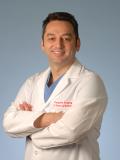Burcin Ekser, MD, PhD

Burcin Ekser, MD, PhDis an Assistant Professor of Surgery and Attending Transplant Surgeon at Indiana University School of Medicine where he completed his clinical fellowship in Abdominal Organ Transplant Surgery. He completed his residency in General Surgery with magna cum laude at the University of Padua, Italy. He spent several years in Xenotransplantation Research under the supervision of Dr. Emanuele Cozzi (Italy), and of Dr. David K.C. Cooper at the Thomas Starzl Transplantation Institute, University of Pittsburgh. He is currently the Director of Transplant Research and Xenotransplantation Research Laboratory at Indiana University. His lab is involved in genetic engineering, xenoimmunology, coagulation dysregulation, identification of new xeno-antigens, tissue engineering, 3D-organ bioprints with a main focus in 3D liver bioprints for drug toxicity, and drug discovery. He has introduced a novel idea in xenotransplantation research which involves scaffold-free 3D-bioprinting of genetically-engineered pig organ models with their continuous perfusion using the bioreactor. He is a good standing and active member of many societies including, TTS, IXA, AST, ASTS, ESOT, ILTS, SITO, AASLD. He serves as the Chair of the Basic and Translational Research Committee of the ILTS and as a Councilor for the IXA. He published >110 peer-reviewed scientific articles and book chapters and won several young investigator and rising star awards (ATC, ILTS, IXA, TTS).
Financial relationships
**Disclaimer**
This Continuing Medical Education (CME) Learning Management System, Ethos, includes individuals designated as 'faculty' for CME purposes. Please note that the term 'faculty' refers solely to their role as a contributor/planner within a CME activity and does not imply any formal affiliation with UT Southwestern Medical Center (UTSW). The display of names and credentials is intended for educational purposes only and does not necessarily indicate a professional or academic relationship with UTSW. Participants are encouraged to verify the affiliations and credentials of faculty members independently if further clarification is needed.

 Facebook
Facebook X
X LinkedIn
LinkedIn Forward
Forward